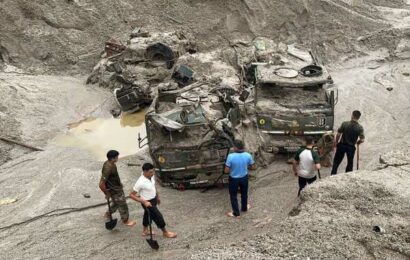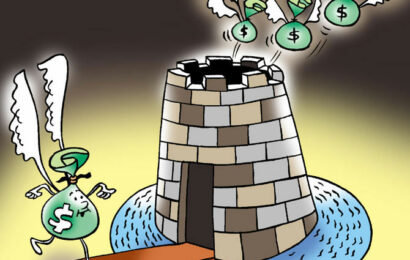‘They had been locked up for 17 days and the door was opened and they’re like, ‘We’re not going on one of these stretcher things. We’re out of here’!’
‘Then someone says, ‘They’re all out!’ ‘They are all safe?’ ‘Yes, they’re all safe’.’
‘I am like aaaaahhh. I cried happy tears.’
After the Silkyara tunnel rescue in Uttarakhand, wherever Professor Arnold Dix went in India, he would be mobbed. He said he felt, for the first time, like quite the celebrity.
He was asked who would play him in a Bollywood film on the rescue operation and jovially offered himself up as an ‘extra’.
“Even if I wasn’t wearing my smelly orange shirt, my crazy hat, everyone recognised me. I don’t look like a celebrity. I mean, I think I just look a bit strange at best, because I’m just an old bloke with a funny beard, weird hair.”
Fame has followed Dix back to Australia.
So has that immense feeling of happiness. And the deep sense of spirituality and contentment. He still gets up every morning on a high, with a walking-on-clouds kind of elation.
Dix has returned to his serene Monbulk farm, 42 km out Melbourne, near the Dandenong range, where he grows vegetables, beans, berries and raises chickens, leading his quiet, slightly unworldly life that perhaps was somewhat responsible for his ability to “tune into India” so easily.
“I watch the sun come up here. I view the mountains.” And Dix remembers the mighty Himalayas and the Happily Ever After story that he helped craft and bring to life. “It’s just so nice. I haven’t had many good, nice stories in recent years.”
In Part III of his interview to Rediff.com‘s Vaihayasi Pande Daniel, the underground specialist further recalls the tunnel rescue experience, for which he volunteered his services, without a fee, to the Indian government, because he was “helping your friends.”
The concluding segment of a MUST READ three-part interview:
- Part 1 of the Interview: ‘We’re going to bring these kids home’
- Part 2 of the Interview: ‘Things are done in India that look chaotic. But it’s not chaotic at all’
You seem to have endeared yourself to the whole country and taken to India like a duck takes to water.
…The press was most shocked when I turned up. I’ve come from far flung Europe, I’ve had multiple airplane rides, I haven’t had sleep. I’ve been picked up by a chopper. I’ve been flying up the Himalayan mountains and I get rushed to the tunnel. And the first thing I do is I go to the little shrine and I say a prayer, which is what I thought I should do.
I mean, of course, I would do that. I think everyone was a bit shocked because maybe they’re expecting me to demand a cup of tea. Or I don’t know, for my suit to be pressed or something else instead.
It was natural to do that. Because I’m in the most sacred part of the whole Hindu world and we’ve got a really difficult problem to solve. Why wouldn’t I be humble and maybe seek a bit of guidance? Because isn’t that what people should do? Like how are we going to do battle with a mountain? It’s just li’l ol’ me. I need a bit of help. ‘Give me a bit of guidance here’.
I understand your advice was sought when New York’s Twin Towers fell and you’ve been all over the world.
Did you find yourself hampered by the Indian terrain and how was it different?
It’s the Himalayas. These mountains are fragile. They’re alive. I can feel them moving.
They’ve got the most beautiful forests on them. I’ve never seen families of monkeys and really cheeky monkeys. Different sorts, big ones and little ones. The flowers are really pretty and smell nice. The little creeks are lovely and also what looked like ancient stone fences, that I bumped into as I was wandering around.
I just felt humbled being there. I was in a really special place. I hadn’t felt that really before. Not in such an overwhelming way. I didn’t feel alien. Just welcomed. Like I was playing a part in something really big. All I had to do was to do my thing, play my part and play it really sort of straight and honest, do my best, work as hard as I could and everything would be fine.
I really believed, right from beginning, that were gonna get 41 men home safe. No one was gonna get hurt. Except that it might take up until Christmas. Like that was my only promise that people would be singing for Christmas.
Do you think that this tunnel can be constructed eventually? What’s the future of the Silkyara tunnel?
Yes, of course. I don’t think that’s a problem at all. I didn’t look at why and what happened to happen. But I became pretty familiar with the rocks, because I spent half my time with my head buried in themselves listening to what’s going on.
What did you feel when all the 41 got out? How do you describe that feeling?
It was a complicated answer, because I wasn’t quite sure how many had come out.
The theory was they’re all going to come out, one at a time, on a stretcher and they’d be taken to triage. The reality was once the door was open, they all just came bouncing out in around five minutes. There was no holding them back. That’s why it was so funny on the airplane, asking them whether or not they would be able to use the emergency door.
So, they went out in no time at all. They had been locked up for 17 days and the door was opened and they’re like, ‘We’re not going on one of these stretcher things. We’re out of here’! And through they came, which was fantastic.
That was a bit of a surprise. I was sitting up where they were being received, I’ve got my back against the wall — you might have seen in the videos — behind all the families, while they’re coming out. And I couldn’t tell how many had come out because they were bouncing around everywhere. I was also expecting them one at a time.
Then someone says, ‘They’re all out!’ ‘They are all safe?’ ‘Yes, they’re all safe’.
I am like aaaaahhh. I cried happy tears.
‘What about the emergency guys?’ I then went back in and found the emergency guys…
Once I knew all the emergency guys were okay… Then it was like a new emotion that I’m not quite sure of. Or if there is a word for it. It’s like contented. I know that sounds really strange. It wasn’t happy or sad. I felt contented.
WATCH: Arnold Dix spending time with the rescue team
At peace?
Yes. It was really weird. It was like, ‘Thank you’.
As if we’ve found that sort of new harmony or a new balance or something. We’re really peaceful, contented. It wasn’t about screaming or anything. It was as if I’d had a beautiful meal, that’s not too much or too little, not too spicy, not too bland. Just a perfect feeling.
And then we went back to the hotel. I got pushed into a car. Everyone else was yelling, screaming and stuff, out of joy. We got to the hotel and it was someone’s birthday, so we had a birthday party. That was strange. Then we all sang Happy Birthday.
We’ve just rescued 41 men and everything and now we are singing Happy Birthday and having birthday cake. Then everyone patted each other on the back, because we knew how incredibly difficult this was. And we went to bed.
Because I felt so contented, that’s why I had to go back up the mountain to say thank you. The contentment continues. I am still having a bit of a think about it. I’m just looking out at my little mountains here and I’m like: ‘Did that really happen? Or maybe I’m under anesthetic and having a reaction to the drug. I’m hallucinating. Could this really be real?’
I am really contented, really at peace. I feel like I kind of did my thing, whatever it was I wasn’t meant to do. I did it honoUrably, my little part of the big puzzle. I haven’t embarrassed anyone or my country.
My mum was worried I was going to be killed and she’d spoken to my wife that she was worried she was going to be burying me. It was really nice to see her, so she could see that I wasn’t dead! All that sort of stuff. I just feel like, ‘Okay, done. I’m content. I’m happy. All done’.
Arnold Dix celebrates with Uttarakhand’s SDRF unit
Feature Presentation: Aslam Hunani/Rediff.com
Source: Read Full Article




